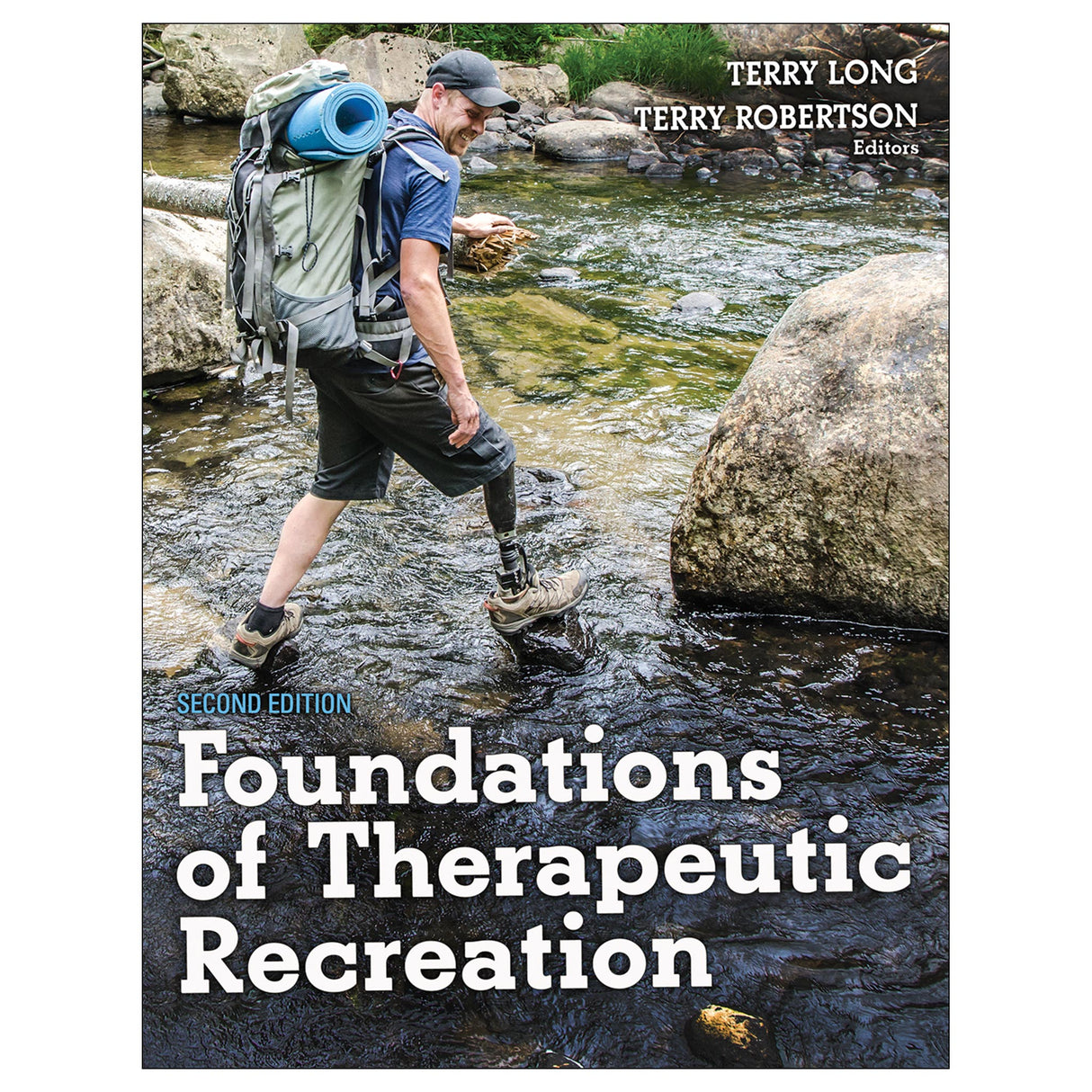Foundations of Therapeutic Recreation-2nd Edition
Author: Terry Long, Terry Robertson
$136.95 CAD
One of the more significant updates to the second edition of Foundations of Therapeutic Recreation is a more contemporary description of models of practice, including significant attention to strength-based models and approaches to practice. In addition, the second edition has been updated to reflect current National Council for Therapeutic Recreation Certification (NCTRC) requirements for obtaining the Certified Therapeutic Recreation Specialist (CTRS) credential. Other updates to this edition include the following:
- Integration of more global perspectives on therapeutic recreation
- Greater emphasis of evidence-based practice for designing and delivering enjoyable and beneficial therapeutic recreation interventions
- Streamlined content and reorganized chapters to facilitate a natural progression throughout the semester
Students will discover potential areas in which therapeutic recreation can be practiced—including mental health centers, programs for those with developmental disabilities, physical rehabilitation facilities, youth development programs, and programs for the aging population—and will also be exposed to potential changes and uses of therapeutic recreation as technology innovations, public policy, and service demand trends evolve.
Plus, instructors will find a suite of ancillaries to assist in managing their course. The instructor guide includes learning objectives for each chapter along with sample classroom activities and assignments. The test bank has been expanded, and the presentation package has undergone significant revisions to reflect the content of the text.
Foundations of Therapeutic Recreation, Second Edition, provides students with evidence-based information on fundamental concepts in the field of therapeutic recreation. With a reader-friendly format and engaging style, this text will help students explore the various career possibilities in the field.
Audience
Textbook for introductory higher education courses in therapeutic recreation; also a professional reference for practitioners who work in recreational therapy.Chapter 1. Considering Therapeutic Recreation as Your Profession
Terry Robertson
Terry Long
What Is Therapeutic Recreation?
A Diverse Profession
Choosing a Profession
Summary
Discussion Questions
Chapter 2. History of Therapeutic Recreation
Rodney Dieser
Importance of History
Origins of the Profession (Late 1700s to Mid-1900s)
Philosophical Battles in Therapeutic Recreation (1945-1965)
The Utopian Years of Therapeutic Recreation (1966-1984)
The Fragmentation Years of Therapeutic Recreation (1985-2000)
Therapeutic Recreation in the 21st Century
Summary
Discussion Questions
Chapter 3. Professional Opportunities in Therapeutic Recreation
Michal Anne Lord
Ramon B. Zabriskie
Characteristics of a Profession
Professional Preparation in Therapeutic Recreation
Professional Organizations
Professional Networking
Summary
Discussion Questions
Chapter 4. Person-First Philosophy in Therapeutic Recreation
Mary Ann Devine
Jessie L. Bennett
Who Is the Person With a Disability?
Person-First Philosophy
Using Person-First Philosophy
Attitudes Toward People With Disabilities
Service Delivery
Summary
Discussion Questions
Chapter 5. Models and Modalities of Practice
Jamie Hoffman
Terry Long
Therapeutic Recreation Practice Models
Broader Models of Practice
Therapeutic Recreation Treatment Modalities
Summary
Discussion Questions
Part II. Potential Areas of Practice
Chapter 6. The Therapeutic Recreation Process
Terry Long
Assessment
Planning
Implementation
Evaluation
Summary
Discussion Questions
Chapter 7. Therapeutic Recreation and Mental Health
Melissa D’Eloia
Keith Fulthorp
Terry Long
Components of a Healthy Mind
What Is a Mental Disorder?
Role of Therapeutic Recreation in Treating Mental Disorders
Levels of Care in Mental Health
Diagnostic Categories
Theoretical Considerations
Positive Psychology and Related Paradigms
Mental Health and Secondary Disabilities
Common Therapeutic Recreation Modalities for Mental Health
Summary
Discussion Questions
Chapter 8. Therapeutic Recreation and Developmental Disabilities
Susan Myllykangas
Alice Foose
Patricia Ardovino
What Are Developmental Disabilities?
Practice Settings
Neurodevelopmental Disorders
Sensory-Related Developmental Disabilities
Metabolic Disabilities
Degenerative Disabilities
Best Practices
Summary
Discussion Questions
Chapter 9. Therapeutic Recreation and Physical Rehabilitation
Terry Robertson
Jody Cormack
Terry Long
Common Diagnostic Groups in Rehabilitation
Common Therapeutic Recreation Modalities in Rehabilitation
Best Practices
Summary
Discussion Questions
Chapter 10. Youth Development and Therapeutic Recreation
Sydney L. Sklar
Cari E. Autry
Positive Youth Development
Challenges to Positive Development
Theories That Guide Therapeutic Recreation Practice
Prevention, Intervention, and the Therapeutic Process: APIED
Settings and Opportunities
Modalities for Youth Development
Summary
Discussion Questions
Chapter 11. Therapeutic Recreation and Senior Populations
Laura Covert-Miller
Cameo Rogers
The Aging Population
Career Opportunities With Seniors
Theories of Successful Aging
Common Modalities
Dementia Frameworks
Summary
Discussion Questions
Chapter 12. A Global Perspective of Therapeutic Recreation
Rodney Dieser
Heewon Yang
Shane Pegg
Shinichi Nagata
Therapeutic Recreation in Canada
Therapeutic Recreation in South Korea
Therapeutic Recreation in Japan
Therapeutic Recreation in Australia
Summary
Discussion Questions
Chapter 13. Envisioning the Future: Therapeutic Recreation as a Profession
Terry Robertson
Erick Kong
Embracing Our History
The Emergence of a Global Society
The Future of Therapeutic Recreation as a Profession
Worldviews: Finding the Optimal Perspective
Summary
Discussion Questions
Therapeutic recreation is a diverse profession
Who is the person with a disability?
All ancillaries are free to adopting instructors through HKPropel.
Instructor guide. Includes chapter overviews and outlines, learning outcomes, discussion questions, and web links, as well as learning activities designed to allow students to apply the content addressed in each chapter.Test package. Includes a bank of questions—in true-or-false, fill-in-the-blank, essay, short-answer, and multiple-choice formats—covering the content from all chapters.
Presentation package. Includes PowerPoint slides of text, artwork, and tables from the book that can be used for class discussion and presentation. The slides in the presentation package can be used directly within PowerPoint or printed to make transparencies or handouts for distribution to students. Instructors can easily add, modify, and rearrange the order of the slides.





